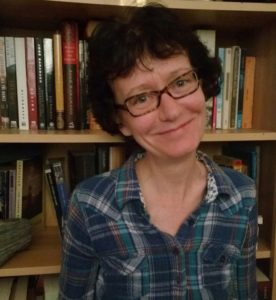Know Your Profs is an ongoing series of profiles on the instructors at Camosun College. Every issue we ask a different instructor at Camosun the same 10 questions in an attempt to get to know them a little better.
Do you have an instructor that you want to see interviewed in the paper? Maybe you want to know more about one of your teachers, but you’re too busy, or shy, to ask? Email editor@nexusnewspaper.com and we’ll add your instructor to our list of teachers to talk to.
This issue we talked to Camosun English prof Kelly Pitman about how much teachers think about students, her swearing habit, and the ups and downs of education as job training.
1. What do you teach and how long have you been at Camosun?
English. 16 years.
2. What do you personally get out of teaching?
It engages both my brain and my heart, which is everything you could ask for in a job, and I believe in the importance of learning, so my work is meaningful to me.

3. What’s one thing you wish your students knew about you?
Maybe they already know more than they want to. But, seriously, something students might be interested to know about me and other teachers is that we think about them even outside the classroom. We notice when they disappear. We feel sad for them when they struggle. We feel thrilled when we see them come into their own. It wouldn’t be unusual for me to be eating breakfast and thinking about how to help a particular student be more engaged or less discouraged.
4. What’s one thing you wish they didn’t know about you?
Well, I am prone to swearing, but I am working on that.
5. What’s the best thing that’s happened to you as a teacher here?
I love it when students tell me that they didn’t think they’d like writing, or reading, or poetry, and it turns out they do. A more specific thing is that this spring I’m leading a field school course on Irish literature, and it finishes up in Ireland. I’m stoked about that.
6. What’s the worst thing that’s happened to you as a teacher here?
Budget cuts.
7. What do you see in the future of postsecondary education?
I’ve been worried for a long time about the attitude of governments and, increasingly, citizens that education is about jobs and money; jobs that powerful industries have deemed important. Sure, everyone needs a job, and education plays a role in that. However, I feel the long-term personal and cultural benefits of learning are more important.
The premise of education is that a society full of open-minded, knowledgeable people who can really think can discover better ways to live. Education should be about seeking understanding, freely exchanging ideas, and learning to reason rigorously, so it disturbs me when I hear people speak of schools as merely serving the economy or individual material success.
But I have a lot of hope. I believe that people who come to school for the narrow purpose of job training can end up learning how to be thoughtful citizens. The world has problems, and teaching people to think deeply is our best chance of fixing them. I think students should be asking themselves not just what school does for them and for business but also how they are going to use their learning to help to challenge the assumptions, lies, misperceptions, and cruelties that are too common in the world. To do that, they need to study a lot of things, not just what their future bosses want them to study.
8. What do you do to relax on the weekends?
I read. A lot. I walk in Garry Oak meadows or by the sea. I rummage through thrift stores. I hang out with my family.
9. What is your favourite meal?
How to choose? There are so many yummy things. I love Indian food, Italian food, Mexican food, Thai food. I am especially happy that someone came up with peanut sauce. That stuff is awesome.
10. What’s your biggest pet peeve?
Unkindness.
